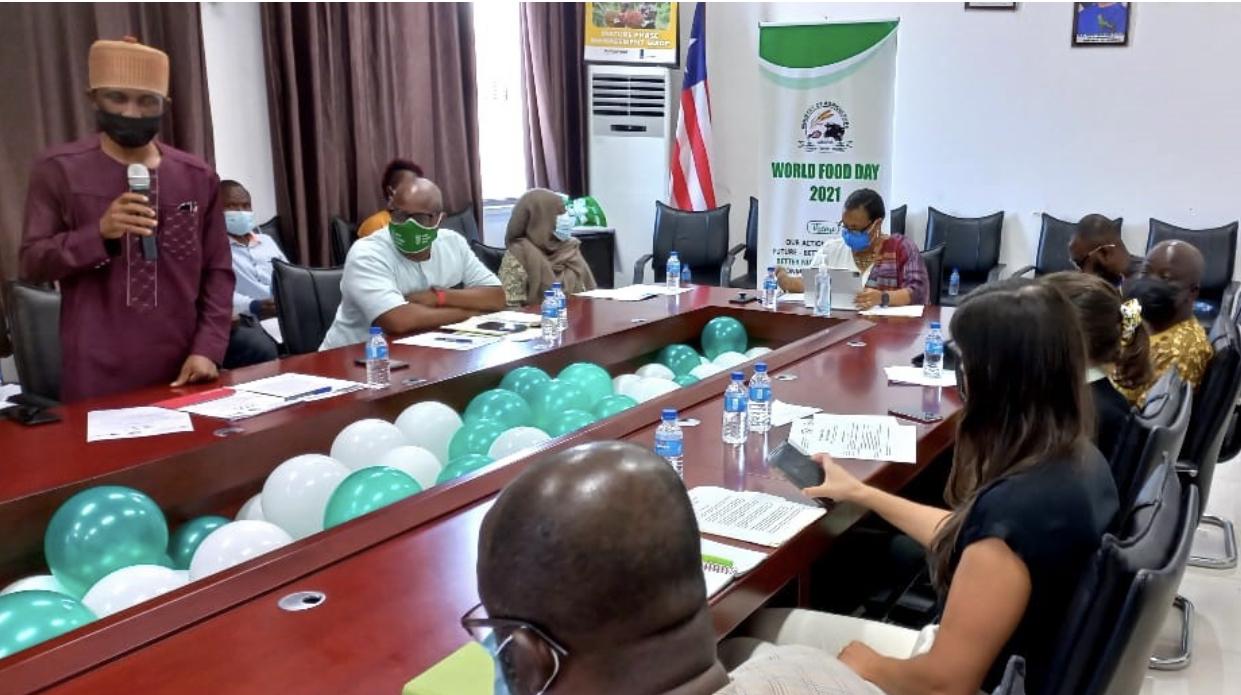
Africa-Press – Liberia. Liberia Agriculture Minister Madam Jeanine Cooper says, Liberia has experienced tremendous improvement in its food security sector for which she credited to the collaboration and cherished partnership between Liberia and its partners.
According to her, the Liberian Government has a firm commitment on practical actions to ensure that Liberia strives towards food security. She said Liberia is experiencing a surge in the number of Liberian food processors with a growing public interest from communities in local food production and consumption.
According to her, in 2019 and 2020, there were 91 agri-businesses registered and more has registered up to current. Young and middle level professional seeing food production in agriculture as a lucrative undertaking which is attracting the interest time and investment of young entrepreneurs.
Speaking at program marking the celebration of World Food Day, Madam Cooper announced that Liberia will shortly join the coalition of action on sustainable productivity growth for food security and resource conversation-led by the U.S. department of agriculture.
“We look forward to producing more, using fewer inputs, protecting our viable resources, counting on scientific and technological information as we work with our partners to sustain Liberia’s valuable forest, mangrove and ecosystem,” Madam Cooper said.
Liberia over the weekend joined the rest of the World to celebrate World Food Day. The event was celebrated with an estimation from the Food and Agriculture Organizationthat (FAO) says as much as $40 to $50 billion in annual investments on targeted interventions are needed to end hunger by 2030. According to the FAO there are plenty of low-cost, high-impact projects that can help hundreds of millions of people better meet their food needs.
The FAO also said, the targeted interventions on Research and Development to make farming more technologically advanced, innovation in digital agriculture, and improving literacy rates among women can go a long way to reducing hunger. But there are also other essential elements such as better data, governance, and institutions that need to be added to the equation.
Madam Mariatou Njie, FAO country Representative to Liberia said, the approach can only be effective if it’s rooted in working together with governments, and key partners, as they forge their own national pathways towards transformation in line with their specific conditions and needs.
“We also need to realize that scientists and bureaucrats and even food producers and distributors will never be able to bring about all these desperately needed changes on their own.”
She also believe that the transformation can and must start with pragmatic and concrete action by ordinary consumers and the choices they make. The decisions they make every day on the foods they consume, where they buy them, how they are packaged, how much food they throw away – all these have an impact on n agri-food systems and the future of this planet.
“All of us have the potential to be food heroes. Our actions are our future. The process of transforming our agri-food systems — and making an impact on global hunger, healthy diets, environmental damage, and waste — starts with you and me.
“But it doesn’t end with you and me. The old adage goes: “We are what we eat.” It also holds true that how our children and grandchildren develop will also be influenced by what we eat. Hope is in their hands to carry on. Let us learn together, work together and contribute together.
She also informed famers and the ministry of Agriculture that the FAO has already rolled up it sleeves and got down to the practical tasks of leading the implementation and driving the transformation.
“A groundbreaking World Food Forum was successfully convened here in the Italian capital early this month, powered by the global youth, and youth representatives at FAO and our sister agencies focused on harnessing the creativity and resilience of our younger generations.
“They have the most at stake. They will be the ones living with the direct consequences of the climate crisis and malfunctioning agri-food systems. At the same time, the 1.8 billion young people in the world today between the ages of 10 and 24, of which nearly 90 percent are living in developing countries, provide an unlimited potential to tap.”
According to her, The FAO already started to leverage that into widespread awareness, holistic solutions, and concrete youth-led actions for change. Of course the young aren’t the only ones who need to worry about our agri-food systems not being fit for purpose, and on how to make them more efficient, inclusive, resilient, and sustainable.
Even before COVID-19 shone a spotlight on the vulnerability of the world’s agri-food systems, hundreds of millions of people worldwide were afflicted by hunger – and that number has increased in the last year up to 811 million. Despite the world producing sufficient food to feed all of us. This is unimaginable and unacceptable.
At the same time, 14 percent of the food we produce is lost, and 17 percent is wasted. Combine this with other stressors — sch as pests and diseases, natural disasters, loss of biodiversity, habitat destruction, and conflict — and you can see the magnitude of the challenge we face in meeting the world’s growing food needs, while simultaneously reducing the environmental and climate impact of our agri-food systems.
FAO, as the leading agency working on food and agriculture, has developed a toolbox which we are confident can enable us to make an impact on many of these complex systemic problems.





